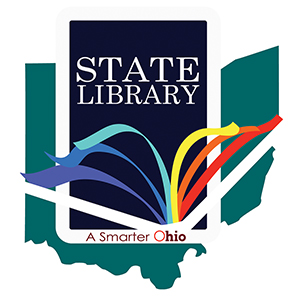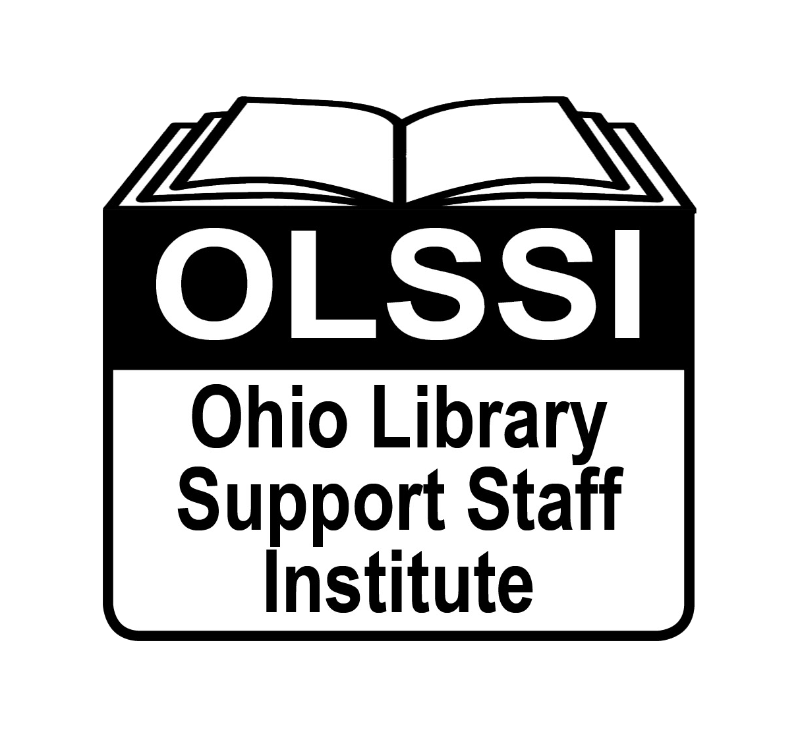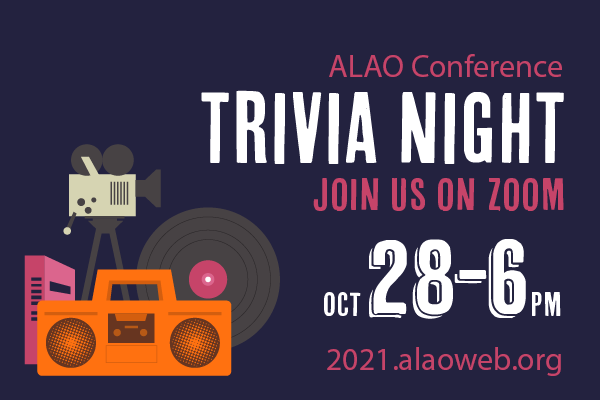Switch to Session Search Thursday, October 21
Ask Me Anything: Working with Art and Cartoons
-
Caitlin McGurk Billy Ireland Cartoon Library and Museum at The Ohio State University
-
Laura Ponikvar Jessica R. Gund Memorial Library at The Cleveland Institute of Art
Wednesday, October 27
Virtual Help Desk
Business Meeting
Preconference: Loving thy Neighbor: Creating Coalitions and Deconstructing Vocational Awe
-
Fobazi Ettarh iSchool at the University of Illinois’ Urbana-Champaign
ALAO New Member Orientation Session
Thursday, October 28
Virtual Help Desk
Opening Keynote: What is at work in our library work?
-
Sofia Leung Do Better, Be Better, LLC
Connecting Instructors with Resources: The Trials and Triumphs of Creating an Instructor Resources Site
-
Allison DeVito The Ohio State University
-
Amanda Larson The Ohio State University
-
Hanna Primeau The Ohio State University
-
Jane Hammons The Ohio State University
What Else Could Happen?: Disaster Planning and Recovery in the Age of COVID
-
Victor Fleischer The University of Akron
Tackling Racism One Book at A Time: The First & Second Chapter
-
Sterling Joseph Coleman, Jr. Clark State College
Creating an Individualized Patron Dashboard using Existing Data Sources
-
Ken Irwin Miami University
Lunch
ALAO Awards Presentation at 12:30pm
Cataloging as civic engagement: Providing inclusive local subject alternatives to offensive headings
-
Masha Stepanova Miami University
Thriving Through Human Centered Approaches to Change
-
Annie Bélanger Grand Valley State University Libraries
-
Meghan Musolff University of Michigan Library
Lightning Talks #1
-
Clayton Hayes Wayne State University Libraries
-
Joshua Neds-Fox Wayne State University Libraries
-
Josie Evans-Phillips University of Cincinnati
-
Judith Wiener The Ohio State University Health Sciences Library
-
Madeleine Gaiser University of Cincinnati
-
Meris Longmeier The Ohio State University
I Like the Way You Did That! Collaborative Chat Review for Continuous Assessment & Improvement
-
Jennifer Nyiri Bowling Green State University
-
Linda Rich Bowling Green State University
-
Vera Lux Bowling Green State University
Data-Driven Research to Connect the Academic Library to Institutional Priorities and Enhance User Experience
-
Kyle Moll BHDP Architecture
-
Tom Sens BHDP Architecture
Decentralizing Anti-Racism Content in LibGuides: A Disciplinary-Integrative Approach
-
Katie Foran-Mulcahy University of Cincinnati
-
Madeleine Gaiser University of Cincinnati
ALAO Trivia Happy Hour
Friday, October 29
Virtual Help Desk
Building a Bridge between Art and Experiential Learning in an Academic Library
-
Gerald Natal The University of Toledo
More Than Just a Diary: Reflective Practice for Academic Librarians
-
Eric Bradley Goshen / PALNI
-
Ruth Szpunar PALNI
Academic Library Jobs: Trends From the Evolving Landscape
-
Jenny Donley Ohio Northern University
-
Kathleen Baril Ohio Northern University
Do students really hate e-books?: Analyzing e-book use among college students
-
Jessie Long Miami University Regionals
-
John Burke Miami University Regionals
-
Krista McDonald Miami University Regionals
-
Mark Shores Miami University Regionals
One size doesn’t fit all: tailoring DEIA for academic libraries of different sizes
-
Cara Calabrese Miami University
-
Ione T. Damasco University of Dayton
-
Kathleen Baril Ohio Northern University
-
Kim Hoffman Miami University
Rethinking the Research Consultation: A Model for Bridging Student Needs with Faculty Expectations Through Effective, Efficient, and Exceptional Service
-
Kari Siders Cedarville University
-
Kirsten Setzkorn Cedarville University
-
Nathanael Davis Cedarville University
Lunch
Interest Group Lunch Meetups: Special Collections & Archives (SCAIG), Scholarly Communications (SCIG), STEM (STEMIG)
Lightning Talks #2
-
Bart Lenart University of Calgary
-
Cori Wilhelm SUNY Canton
-
Giovanna Colosi Syracuse University
-
Hanna Schmillen Ohio University Libraries
-
Jaclyn Spraetz Miami University
-
James Murphy University of Calgary
-
Marc Stoeckle University of Calgary
-
Nate Floyd Miami University
Even Flow : Using Microsoft Flows to streamline library acquisitions work
-
Carissa Thatcher University of Cincinnati
Building bridges connecting students to primary sources from a distance: Converting in-person activities to an online format.
-
Miriam Intrator Ohio University
-
Paul C. Campbell Ohio University
Maker Literacy and the ACRL Framework
-
Sarah Nagle Miami University
Closing Keynote: Re-Envisioning LIS: Activating Social Justice
-
Nicole Cooke School of Library and Information Science, University of South Carolina








